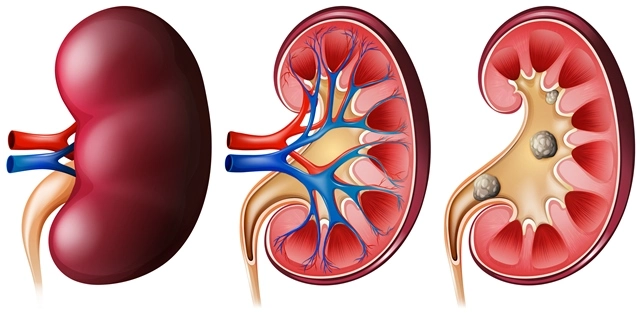
Last Updated on August 12, 2024 by admin
Ayurveda, the ancient system of medicine that originated in India thousands of years ago, provides a comprehensive understanding of various diseases and their treatments. Among the conditions described in Ayurvedic texts is “Ashmari,” a term used to denote urinary calculi or kidney stones. The word “Ashmari” is derived from “Ashma,” meaning stone, and “Ri,” meaning to move or flow. This condition is one of the eight major diseases (Ashtamahagada) described in Ayurvedic literature due to its painful and potentially severe nature.
Causes of Ashmari
Ayurveda attributes the formation of Ashmari to the imbalance of the three doshas: Vata, Pitta, and Kapha, which are the fundamental bodily energies. Specifically, the Kapha dosha plays a significant role in the genesis of urinary stones. According to Ayurvedic theory, when the Kapha dosha becomes aggravated, it leads to the accumulation and crystallization of mineral and organic substances in the urinary system, forming stones.
Dietary habits, lifestyle choices, and other factors such as dehydration, excessive intake of astringent, spicy, and salty foods, and a sedentary lifestyle are considered major contributors to the imbalance of doshas, leading to the formation of Ashmari. The consumption of foods that are heavy, oily, and rich in calcium can exacerbate the condition, as they are believed to aggravate Kapha and Pitta doshas, creating an environment conducive to stone formation.
Types of Ashmari
Ayurveda classifies Ashmari into four main types based on the predominant dosha involved:
- Vataja Ashmari: Caused by the aggravation of Vata dosha, these stones are typically hard, rough, and dark-colored. The symptoms include severe pain in the pelvic region, a sense of dryness, and difficulty in urination. The pain may be sharp and come in waves, correlating with the movement of the stone.
- Pittaja Ashmari: These stones are formed due to the imbalance of Pitta dosha. They are generally yellowish or reddish in color and cause burning sensations during urination, fever, and excessive thirst. Pitta-type stones may also lead to blood in the urine due to the erosive nature of Pitta.
- Kaphaja Ashmari: Caused by the aggravation of Kapha dosha, these stones are soft, smooth, and whitish. Symptoms include a feeling of heaviness in the lower abdomen, mild pain, and cloudy urine. The condition progresses slowly, and the pain is usually dull but persistent.
- Shukraja Ashmari: This type of stone is associated with abnormalities in the reproductive system, particularly in men. The stones are believed to originate from the Shukra dhatu (reproductive tissue) and can cause issues such as erectile dysfunction and infertility, along with typical symptoms of urinary stones.
Ayurvedic Management of Ashmari
Ayurvedic treatment for Ashmari involves a combination of dietary changes, lifestyle modifications, herbal remedies, and Panchakarma therapies. The primary goal is to balance the aggravated doshas, break down the stones, and facilitate their expulsion from the body.
- Herbal Remedies: Various herbs are used in Ayurveda to manage Ashmari. Gokshura (Tribulus terrestris), Pashanbheda (Bergenia ligulata), and Varuna (Crataeva nurvala) are some of the well-known herbs with lithotriptic (stone-dissolving) properties. These herbs help in breaking down the stones and reducing inflammation in the urinary tract.
- Panchakarma: Panchakarma therapies, such as Virechana (therapeutic purgation) and Basti (medicated enema), are employed to cleanse the body of toxins and balance the doshas. These therapies help in expelling the broken-down stones and preventing recurrence.
- Diet and Lifestyle: Dietary recommendations include avoiding foods that aggravate Kapha and Pitta, such as dairy products, red meat, and excessively spicy foods. Instead, a diet rich in fruits, vegetables, and water is encouraged to prevent stone formation. Regular physical activity is also advised to maintain dosha balance.
Conclusion
Ashmari, or urinary calculi, is a condition well understood and managed in Ayurveda through a holistic approach that encompasses diet, lifestyle, herbal medicine, and detoxification therapies. By addressing the root cause—dosha imbalance—Ayurveda offers a natural and effective way to prevent and treat kidney stones, promoting overall health and well-being.
MORE POSTS: How to Start Living a Healthy Lifestyle the Ayurveda way?

Leave a Reply